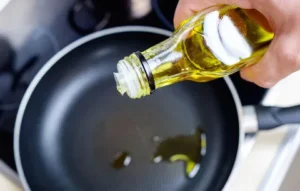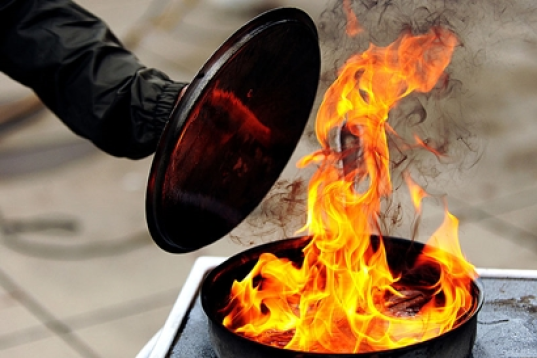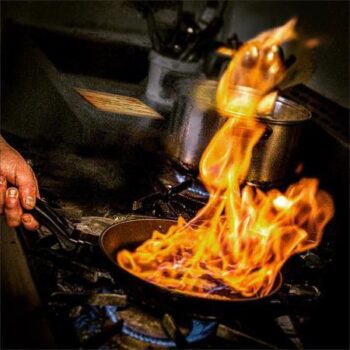Olive oil is a vegetable oil derived from the fruit of the olive tree. It can be used in cooking, cosmetics, skin care and as a fuel for traditional lamps. It is made up of mostly monounsaturated fats, with smaller amounts of polyunsaturated fats and saturated fats. Also, it is one of the best known for cooking but can olive oil catch on fire, and what are ways to prevent it?
Olive oil is made up of the fatty acids oleic acid (50-80%), linoleic acid (10-20%), and palmitic acid (5-15%). If olive oil is heated to high temperatures, these fatty acids can start to break down. When this happens, the mixture will begin to smoke, and they may catch fire. The smoke produced by burning olive oil is toxic, so you should never attempt to put out a fire with it.
Olive oil is fat, and fats can combust. This is true of any fat, including vegetable oils and animal fats. Olive oil has a flashpoint of 450 degrees Fahrenheit, which means it will start to burn at that temperature or higher.
The flashpoint of a substance is the temperature at which its vapor pressure is equal to its surrounding air pressure, such that it can ignite. This page will take you through all you need to know about being safe whenever you are using olive oil for cooking.
What is olive oil?
Olive oil is a vegetable oil that is extracted from the fruit of the olive tree. Olive trees are native to the Mediterranean region, but they have been cultivated in other areas for thousands of years. While olives are still harvested for their meat and eaten as a snack food, it is their oil that is most commonly used today.
It is often used in cooking, either alone or with other oils such as canola or peanut. It’s also added to salad dressings, sauces, and dips. In addition, olive oil has long been considered an important part of a healthy diet because it contains monounsaturated fat, which helps lower cholesterol levels in the body.
Facts about olive oil
- Olive oil is a type of vegetable oil that is made from the fruit of the olive plant, which grows in tropical climates.
- Olive oil is used to make biodiesel, which is used to power many vehicles today.
- The olive plant has been around for centuries and was originally cultivated in Africa and Asia but later spread across the globe as people migrated out of those regions and brought their cuisine with them (including their use of olive oil).
- Olive oil can be extracted by pressing or by solvent extraction processes.
- Olive oil is an alternative fuel that burns cleaner than regular petroleum-based fuels. It is made from vegetable oils, such as soybean oil, canola oil, and other kinds of cooking oils.
- Olive oil is used in biodiesel engines and in heating systems. The olive oil used in vehicles meets the same requirements as petroleum diesel.
- Because it burns cleaner than regular petroleum-based fuels, it produces fewer harmful emissions.
Where is olive oil made from?
Olive oil is made from the seeds of a tree that grows in tropical regions. The seed has to be crushed and heated for the oil to be extracted from it.
The first step in making olive oil is to harvest the seeds from the trees. They are then dried out and crushed before they are put into a machine called a mill. This machine heats them up until they become liquid and can be extracted.
Benefits of olive oil

Olive oil is one of the most beneficial foods in the world. It’s also one of the most versatile, used in everything from cooking to skincare.
It is rich in monounsaturated fatty acids, which are known to help lower cholesterol, reduce inflammation, and improve heart health. It can also act as an antioxidant when consumed regularly. It can also help prevent cancer and reduce the risk of developing cardiovascular disease.
Here are just some of the things olive oil does for your body:
- Helps lower bad cholesterol levels
- Keeps blood sugar levels stable
- Supports skin health
- Protects against heart disease and cancer
- It helps fight age, thanks to its anti-inflammatory properties
- It can help with weight loss
- It can help treat Dementia and Alzheimer’s Disease
- It helps to improve brain functions
What makes olive oil flammable?
Olive oil is flammable because it contains a large number of fatty acids. Fatty acids are hydrocarbons, meaning that they are made up of hydrogen and carbon atoms. In fact, olive oil is about 90% fatty acid.
A hydrocarbon molecule that has only one double bond between two carbons is called an alkane (this is the simplest possible form of hydrocarbon).
An alkane with two double bonds between two carbons is called an alkyne (and it’s more reactive than an alkane). A hydrocarbon molecule with three or more double bonds between two carbons is called an alkylbenzene.
When you light olive oil on fire, you’re breaking apart the long chains of fatty acids into smaller pieces (called free radicals), which then react with oxygen in the air to create heat and light.
Note: Olive oil is flammable because it contains a lot of fatty acids and alcohols, which makes it an excellent fuel source.
Can olive oil start a fire alone?
Olive oil can start a fire, but only if it’s combined with other flammable materials. It is usually considered a very safe cooking oil, but that doesn’t mean it’s immune to the effects of heat and flame.
The smoke point of extra virgin olive oil is about 410 degrees Fahrenheit, which means that it won’t ignite at that temperature or lower, but once it reaches that point, it will release flammable gases and start to burn.
That is why you should never leave olive oil unattended on a stovetop or over an open flame. It could catch fire if left unchecked.
So, if you’re looking for something to light your firewood with (or perhaps your home), look no further than extra virgin olive oil.
Can olive oil catch on fire?
Olive oil is a flammable liquid and can catch fire if it’s spilled onto a hot surface. Due to this, you need to be careful when pouring olive oil into your frying pan or pot. Make sure that the heat is turned as low as possible, and make sure to turn it off completely when you’re done cooking with the oil. Don’t leave any hot oils unattended.
If you accidentally spill olive oil on the stove or in your frying pan, turn off the heat immediately and get some baking soda or dish soap (which will cut through the grease) onto the spill right away to put out the flames before they spread. Then clean up any residue left behind with soap and water.
Safety tips:
- Never leave olive oil unattended while cooking or baking.
- Never pour hot olive oil directly onto food; instead, let it cool first before using it as an ingredient in your dishes.
- Never use a cooking spray that contains olive oil if you’re going to cook something over an open flame (like grilling or frying).
Does extra virgin olive oil catch fire?

Yes, extra virgin olive oil can catch fire. Extra virgin olive oil is a great source of healthy fats, antioxidants, and vitamin E. It’s also used in cooking and as a skin moisturizer.
It is flammable at high temperatures as it boasts of a flashpoint of about 450 degrees Fahrenheit (about 200 degrees Celsius). This means that if you heat up extra virgin olive oil to about 450 degrees Fahrenheit (about 200 degrees Celsius), it may ignite.
If you’re cooking with extra virgin olive oil and accidentally leave it unattended on the stovetop, or if you spill some on your countertop while cooking and don’t notice it until later, these are both situations where the extra virgin olive oil may catch fire.
Flashpoint of extra virgin olive oil
Extra virgin olive oil has a higher flash point than regular olive oil, but it’s not as high as you might think.
Extra virgin olive oil has a flashpoint of about 450°F. This means that if you were to put a small amount of extra virgin on your stovetop at home, it would begin smoking before it caught fire.
Can oil catch on fire in the oven?
Oil can catch on fire in the oven. There are many reasons why this is true, but the most common one is that it can happen when you’re cooking at high heat. The oil will start to smoke and burn before it catches on fire.
The reason why oil catches fire when heated is because of the high content of unsaturated fats. When these fats are heated, they oxidize and form free radicals, which react with oxygen molecules to create heat and light.
If you’re heating up your oil in preparation for deep-frying or pan-frying, you’ve got nothing to worry about. But if you’re cooking something that involves baking at a high temperature (like a cake), then there’s a chance your oil will catch fire while baking.
To prevent this from happening, make sure you keep an eye on your food while it bakes and stir it around every once in awhile, so the edges don’t burn. Also, make sure that if there is any smoke coming out of the oven when baking with oil, turn off the heat immediately.
You will know when this happens because the smoke will be very thick and black, and there will be a smell of burning.
If you don’t take care of the situation quickly, it can get out of hand quickly. If that happens, make sure you turn off your stove or oven immediately.
At what temp does olive oil burn?
Olive oil can burn if you heat it to very high temperatures. The smoke point of olive oil is 410°F (210°C), which means that it starts to smoke at this temperature.
The flashpoint of olive oil is 450°F (232°C). This means that the oil doesn’t start to burn until it’s heated to this temperature and then exposed to air.
If you’re heating olive oil to high temperatures in a pan, you should be careful not to leave it unattended. If the oil gets too hot, it can ignite and cause a fire. The best way to keep your olive oil from burning is to keep an eye on it while you’re cooking.
What is the burning point for olive oil?
The burning point of olive oil is the temperature at which it catches fire. The burning point of any substance depends on several factors, including its composition and the presence or absence of oxygen.
So, olive oil has a higher burning point of 482 degrees Fahrenheit than other types of vegetable oil because it contains more saturated fats than other vegetable oils. Saturated fats are solid at room temperature, so they take longer to burn than unsaturated fats, which are liquid at room temperature.
The presence of oxygen also affects how quickly something will catch fire; when there is no oxygen present in an environment, things burn more slowly because there is no oxidizing agent present (oxygen is an oxidizing agent).
What is the smoking point for olive oil?
The smoking point of olive oil varies depending on the type of olive used to make it and how much of the nut was left in during extraction. Extra virgin olive oil has a higher smoking point than other types because it contains less water.
The smoking point for extra virgin olive oil ranges from 260°F (127°C) to 320°F (160°C), but this can vary based on factors like how the fruit was processed and whether or not it was treated with chemicals during extraction.
Can I bake olive oil?

You can bake with olive oil as it is one of the healthiest fats you can use in your diet (it’s high in monounsaturated fats). It is also one of the most versatile ingredients for cooking and baking.
You can use it to replace butter or shortening in muffins and cookies, and you can use it as a substitute for vegetable oil in cakes and pieces of bread. You can even use it as an ingredient in homemade mayonnaise.
Baking with olive oil can be a great way to add flavor and richness to your baked goods. But there are some risks associated with baking with olive oil, so it’s important to know what they are before you begin.
They tend to have a lower smoke point than other oils, which means that they will start to smoke and burn at a lower temperature than other oils. If you are cooking something that requires high heat, like French fries, using olive oil may not be the best choice for you since it won’t withstand the heat as well as other oils.
Here are some tips to help you get the best baking experience possible:
- Don’t over-beat your dough. If you want to make pieces of bread and pastries, be sure not to over-mix the dough, or else it’ll get tough and chewy.
- Use a thermometer when baking with olive oil. You don’t want to overbake your food, so take regular readings on your oven’s temperature with an oven thermometer.
- Be sure to use a pan that’s made for high heat if you’re cooking or baking with olive oil, as it’ll make a difference.
Can you heat up extra virgin olive oil?
You can heat up extra virgin olive oil. It is a healthy cooking oil that is high in monounsaturated fats and antioxidants and low in saturated fats. It has many uses, including being used as a salad dressing or drizzled on foods after cooking for added flavor.
It also has many health benefits, including reducing the risk of heart disease and lower blood pressure.
Olive oil is a liquid at room temperature, which means that it will not solidify like butter or lard would if left out in the refrigerator overnight. However, extra virgin olive oil can still be heated up to high temperatures without damaging its nutritional value or changing its taste or smell much at all!
To heat up extra virgin olive oil, simply place it in a pan over medium-high heat on your stovetop until it reaches the desired temperature. You may want to use an oven mitt when handling the pan since extra virgin olive oil can get very hot.
Can you use olive oil for high heat cooking?
You can use olive oil for high heat cooking. Olive oil is a healthy fat, and it is great for your heart. It is also very versatile in the kitchen since it has a mild flavor and can be used for sautéing, baking, and stir-frying.
It has been used to cook at high temperatures since ancient times. Olive oil is an essential part of Mediterranean cuisine, which includes dishes like paella and fried calamari.
The problem is that olive oil has a lower smoke point than vegetable oils like canola and sunflower. That means that it will start to break down and smoke at a lower temperature than the other oils. This means that if you use olive oil for sautéing or deep frying, it will burn before the food is cooked through.
If you want to cook with olive oil, we recommend using extra virgin olive oil as opposed to regular olive oil. Extra virgin olive oil has a higher smoke point (up to 410°F), so it won’t break down as easily when exposed to high heat.
Does extra virgin olive oil have a high smoke point?
The smoke point of extra virgin olive oil is 225°C (437°F). The smoke point is when the oil starts to smoke, which can happen at a much lower temperature than this. Also, the smoke point for extra virgin olive oil is higher than that of most other cooking oils, but it does have a lower smoke point than peanut oil or butter.
In addition, the smoke point of any kind of oil is determined by its chemical composition. Extra virgin olive oil has a relatively high percentage of unsaturated fats, which are more volatile and prone to oxidation at high temperatures. Therefore, extra virgin olive oil has a lower smoke point than other types of cooking oils.
How do you put out an oil fire?
In the event that you find yourself with an oil fire, it is important to know how to put it out.
First, make sure the area is clear of any people or animals. If you can’t do this yourself, get help from a friend or family member.
Next, remove any flammable materials from the area where the fire is burning. This includes curtains, furniture, and other items that could potentially catch fire.
If there is a fire extinguisher in your building, use it to douse the flames. If there isn’t one available, call 911 or your local fire department for assistance.
If possible, use water to put out the fire instead of other methods like sand or salt because these will only spread it further and make it harder for firefighters to contain later on.
Is it OK to fry with olive oil?
Yes, you can fry with olive oil. However, you should be aware that olive oil has a low smoke point, meaning that it starts to break down at higher temperatures. If you’re frying food at very high heat, there’s a chance that the olive oil will start to smoke and burn.
If you want to fry with olive oil, we recommend doing so at a lower temperature than the recipe calls for or buying an extra-virgin olive oil that has been labeled as having a higher smoke point. You’ll also want to take care not to overheat your pan as you don’t want your food getting burned.

How to prevent olive oil from smoking?
Olive oil is a great way to cook and season food, but it can also be quite expensive. If you’re trying to avoid smoking your olive oil, there are some simple ways to do so.
First, consider buying extra virgin olive oil, which is more expensive but also more stable than other grades of olive oil. Extra virgin olive oils have higher smoke points and fewer polyphenols, which cause smoke when you cook with them.
Second, make sure your pan is hot enough before adding the olive oil. The hotter the pan when you add the oil, the less likely it will smoke.
Thirdly, don’t leave your pan unattended while cooking with olive oil! This can lead to burning or smoking if you aren’t careful.
Finally, you should use fresh ingredients whenever possible. Fresh ingredients not only taste better than dried ones, but they are also easier on your health overall because they contain fewer preservatives than processed foods do.
How to treat a burn from olive oil?
Olive oil is a delicious and healthy fat that can be used for cooking or in salad dressings. However, it does have the potential to cause a serious burn if you aren’t careful. To treat a burn from olive oil, follow the steps below:
- Immerse the affected area in cold water for 30 minutes or more
- Apply an antibiotic ointment to the burn and cover with gauze or a bandage
- Take ibuprofen or acetaminophen every 4 to 6 hours as needed for pain relief
- Call your doctor if you experience severe pain, swelling, redness, itching, or blistering after 24 hours
What to do when olive oil catches fire?
When you’re cooking with olive oil, it’s important to keep your wits about you. Most of the time, things are going to be fine, but if something goes wrong, it’s good to have a plan of action. Here are some tips for what to do when olive oil catches fire:
- Remove all sources of heat, including the stove and any open flames.
- If there is smoke coming from the pan, remove it from the stove and place it in a safe area.
- Turn off the stove and all other cooking appliances.
- Throw water on the flames. Do not use baking soda or salt; they may make the fire worse.
- If there is still smoke coming from the pan after five minutes, call 911 immediately and wait for help to arrive before attempting to put out the fire again (this may take up to 10 minutes).
Safety tips with olive oil
Olive oil is a staple in many kitchens and is used for salads, sautéing, and dipping. But before you use your olive oil, make sure to follow these safety tips:
- Buy from a reputable source.
- Check the expiration date on the bottle of olive oil before you buy it.
- Store your olive oil in a cool, dark place and away from heat sources like ovens or stovetops to prevent spoilage or rancidity (which can make your oil unsafe).
- Don’t pour olive oil into a pan that’s too hot.
- Don’t heat olive oil over high heat for too long.
- Make sure the olive oil is cool before you use it for cooking again (no double-dipping!)
- Keep your olive oil away from your stovetop, as it can ignite if it’s too close to the flame or burner cap
Conclusion
The reason why olive oil is flammable is that it contains a high amount of monounsaturated fats and low amounts of polyunsaturated fats, which means it burns easily when exposed to heat. But this does not mean that it will catch on fire without being exposed to heat.
This page on can olive oil catch on fire gives the perfect answer to that question. Olive oil can catch on fire if it gets too hot. Olive oil has a flashpoint of approximately 450 degrees Fahrenheit (F), which means that it will begin to smoke and burn at this temperature.
If you accidentally leave your pan to overheat too long, or if the heat is too close to the pan, the olive oil may catch fire.
To prevent this from happening, keep your stovetop at a safe distance from any flames or heating elements when cooking with olive oil. Also, never leave a pan unattended while cooking with olive oil, as this also increases the risk of a fire starting.

